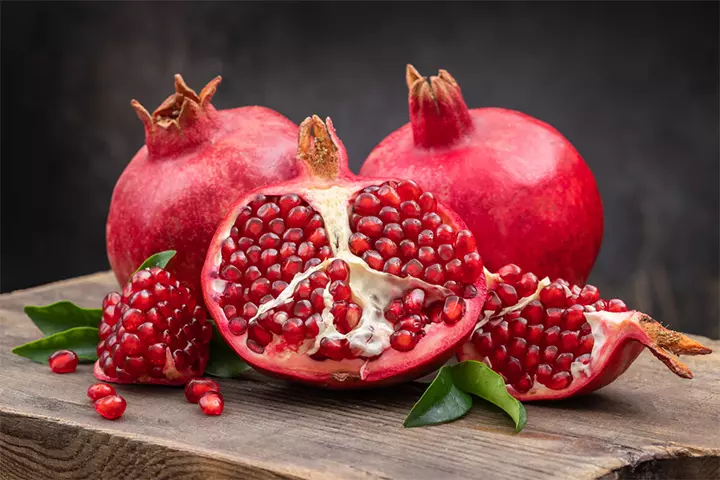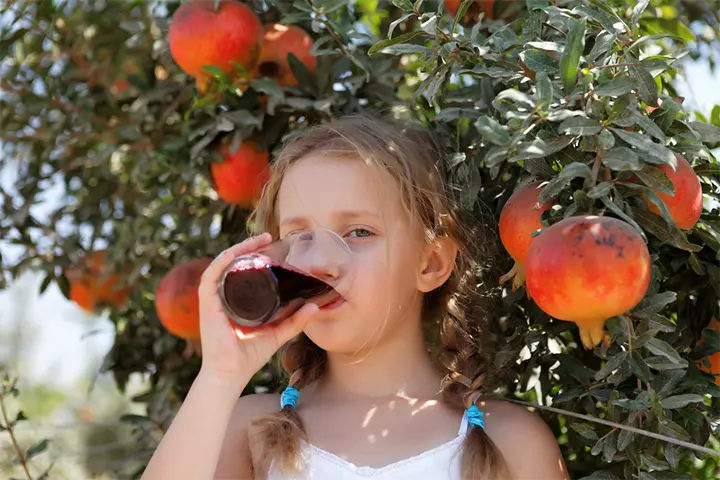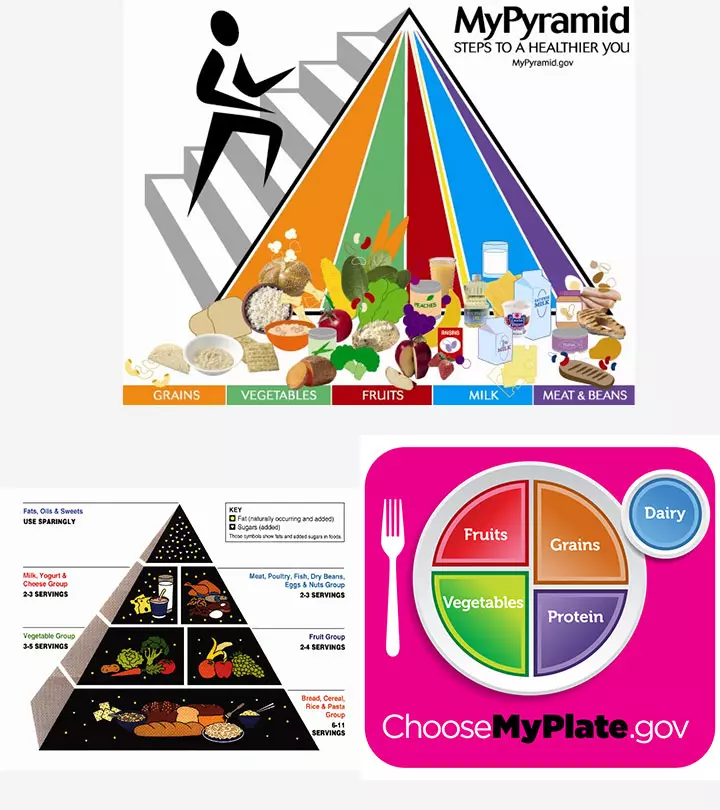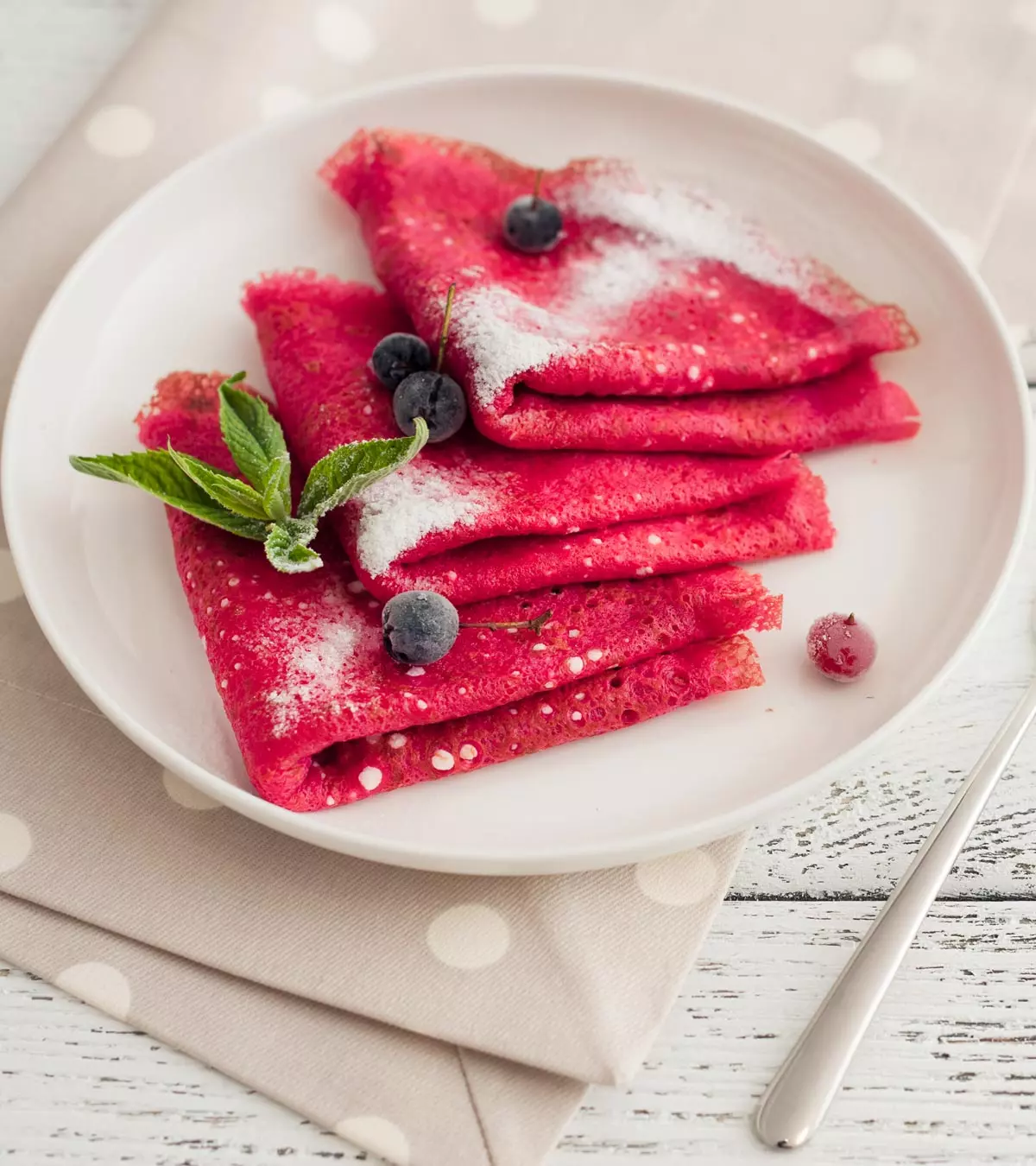
Image: ShutterStock
Pomegranates are juicy fruits that are storehouses of several nutrients. The proven medicinal benefits of pomegranate for kids may encourage you to include this fruit in their diet.
Pomegranates are packed with antioxidants and effectively address various health problems, including stomach disorders, diabetes, heart health, and dental health. They also help regulate fever and fight the common cold. In addition, they are rich in iron, calcium, and fiber and help improve liver function and increase the body’s hemoglobin level.
Keep reading this post to learn more about the various health benefits of pomegranates and how to include them in your child’s diet.
Key Pointers
- Pomegranates are tropical fruits that are rich in vitamins and antioxidants, which offer several health benefits.
- Consuming pomegranates can lower the risk of developing dental problems, treat bacterial infections, and increase hemoglobin levels in the body.
- Fresh pomegranate juice can be served to children without added sugars for maximum benefits.
Facts About Pomegranate

Image: Shutterstock
Pomegranate is popular as a tropical, sweet-flavored fruit with a fairly tart taste. The bright red colored fruit is semi-seedy and has the size of an average apple. The fruit is native to Granada, Spain, but now you can find it throughout the world. Pomegranate possesses several medicinal properties, so many ancient civilizations, such as Rome, Persian, Indian, and Egyptian, used it as a cure for ailments. So eating pomegranate is beneficial for the growth and development of kids of all ages.
 Point to consider
Point to considerTop 10 Health Benefits Of Pomegranate For Kids
The following are some amazing benefits of pomegranate for your little ones.
1. Treats inflammation
Medical studies reveal that pomegranate juice destroys bacterial infections, eliminates irritants from the body, and minimizes inflammation. The fruit contains several biochemicals and enzymes, so it possesses anti-inflammatory properties (1).
2. Remedy for digestive problems
Kids often suffer from digestive issues, such as diarrhea and dysentery. Pomegranate juice effectively treats dysentery, cholera, and diarrhea in children caused by viral or bacterial infection. Pomegranate peel, leaves, and bark can help in digestion and calm stomach disorders.
3. Eliminates intestinal worms

Image: Shutterstock
Kids often suffer from infection resulting due to intestinal worms. Intestinal worms are parasites thriving on nutrients in the small or large intestine. Drinking pomegranate juice helps kill intestinal worms effectively and cures the infection.
 Be watchful
Be watchful4. Regulates fever
Kids also suffer from fever. Drinking pomegranate juice not just regulates fevers but also provides essential nutrients to your kid while he or she is down with fever. Antioxidants in the fruit combat common cold and regulate flu or fever resulting from it.
5. Treats dental problems
Dental issues in kids are rising exponentially. Eating pomegranate is beneficial for treating dental problems. Pomegranate treats teething problems in kids as well as protects their teeth from many oral ailments, such as gingivitis. The fruit possesses antiviral and antibacterial properties that help minimize the adverse effects of dental plaque and prevent the risk of oral diseases.
6. Protects the liver
Eating pomegranate improves the functioning of a kid’s liver. Oxidative stresses can increase in childhood. Pomegranate possesses antioxidants that aid in combating oxidative stresses and safeguarding the liver (2). A study conducted by researchers from multiple institutions has shown that pomegranate juice may help reduce superoxide anion generation in whole blood by 50%. Superoxide anion is a reactive oxygen species that causes oxidative stress in the body.
7. Treats anemia
Pomegranate for kids supplies iron to their blood, thus increasing the hemoglobin count. Healthy hemoglobin levels minimize the symptoms of anemia, such as weakness and dizziness.
8. Anti-carcinogenic

Image: Shutterstock
Pomegranates are rich in antioxidants popular as flavonoids that are quite effective in counteracting cancer radicals. Regular consumption of the fruit prevents the risk of development of cancer in kids. Natural aromatase inhibitors in the fruit prevent kids from early puberty and the risk of development of breast cancer in later life (3).
9. Treats muscle aches
Pomegranates are rich in minerals like potassium, which aids in curing muscle aches and minimizing body pains.
10. Boosts immunity
Pomegranate contains a high amount of B vitamins that help maintain a strong nervous system and an immune system in kids. Vitamins in the fruit also help maintain brain functions optimally and facilitate cognitive development. A high folate content in the pomegranate provides your kid’s body the ability to generate and maintain new body cells.
How Can You Provide Pomegranate To Your Kid?

Image: Shutterstock
Since a considerable part of this nutritious fruit contains seeds, your kid may find it difficult or troublesome to eat pomegranate easily. So, you can provide your kids with fresh pomegranate juice since it’s quite easy to drink it rather than eating a semi-seedy fruit. However, giving juice is not advisable unless and until anyone is not able to chew and swallow the fruit at all. Additionally, avoid giving whole pomegranate seeds to babies or toddlers, as they may pose a choking hazard. If you notice any allergic reaction in your kids, such as swelling of face or tongue, stop giving pomegranate to the kids immediately.
Recipes Using Pomegranates For Kids
In addition to pomegranate juice, here are two interesting and easy-to-make recipes that can be used to incorporate the goodness of pomegranate into your kid’s diet.
1. Pomegranate Power Parfait

Image: Shutterstock
You will need:
- 1 cup plain Greek yogurt
- 2tbsp honey
- 1/4 cup pomegranate arils
- Granola
- 1 cup granola of your choice
- 1/4 cup almonds, chopped
- 1 cup mixed berries (strawberries, blueberries, raspberries)
How to:
- In a bowl, mix together Greek yogurt, honey, and pomegranate arils to create the pomegranate yogurt. Set aside.
- In another bowl, combine granola and chopped almonds for a crunchy topping.
- In serving glasses or bowls, layer the granola-almond mixture, pomegranate yogurt, mixed berries, and.
- Repeat the layers until you reach the top, finishing with a sprinkle of granola and a few pomegranate arils.
- Serve chilled and let the kids enjoy this delightful and nutritious pomegranate power parfait!
2. Pomegranate Popsicles

Image: Shutterstock
These refreshing Pomegranate Popsicles are the perfect addition to battle the heat on a hot summer day.
You will need:
- 2 cups pomegranate juice (freshly squeezed)
- 2tbsp honey or any other natural sweetener
- 1tbsp lemon juice
- Pomegranate Seeds (optional, for added texture)
How to:
- Combine pomegranate juice, honey, and lemon juice in a bowl. Stir well until the sweetener is fully dissolved.
- Add a handful of pomegranate seeds to the mixture and gently mix.
- Pour the pomegranate mixture into popsicle molds, leaving a little space at the top.
- Insert popsicle sticks into each mold and make sure that they stand upright.
- Freeze the popsicles until it is fully set.
- Once frozen, run the molds under warm water for a few seconds to release the popsicles easily.
- Enjoy these refreshing and naturally sweet pomegranate popsicles on a hot day!
Frequently Asked Questions
1. What vitamins are found in pomegranate?
Pomegranate contains vitamin A, vitamin C, vitamin B6, vitamin B12, vitamin D, vitamin E, and vitamin K (4).
2. Which is better, pomegranate seeds or juice?
Like any other fruit, pomegranate seeds as a snack to munch on may be a better choice when compared to juice. However, children unable to eat the fruit due to its seedy texture may enjoy homemade, sugar-free, and preservative-free juice (5).
3. Does pomegranate cause constipation in children?
Pomegranate is not believed to cause constipation in children. Rather, the juice of this fruit may cause loose stools (6).
4. What happens if my child consumes pomegranates every day?
Pomegranate for kids can provide multiple benefits as the fruit is filled with nutrients. Consuming it can help to cure inflammatory and digestive problems. As kids tend to play a lot in the sand, touch things in public spaces, and put their hands into their mouths, they may suffer from worms in the stomach. Consuming pomegranate can help eliminate these worms in children from the intestine. Moreover, it can also help with dental issues, which are highly prevalent among young children. Also, it works to eliminate anemia and increases energy levels and facilitates hydration.
Infographic: Ideas For Including Pomegranate In Children’s Diet
Pomegranates are nutrient-dense fruits that have various benefits, especially for growing children. So are you looking to feed the fruit to your child in a way they love it? Scroll through the infographic below to explore exciting ways to include pomegranate in your child’s diet.

Illustration: Momjunction Design Team
Illustration: Top 10 Health Benefits Of Pomegranate For Kids

Image: Stable Diffusion/MomJunction Design Team
References
- Pomegranate.
https://www.nccih.nih.gov/health/pomegranate - Nadia Z Shaban et al.; (2014); Effect of Punica granatum (pomegranate) juice extract on healthy liver and hepatotoxicity induced by diethylnitrosamine phenobarbital in male rats.
https://pubmed.ncbi.nlm.nih.gov/24650251/ - The incredible pomegranate.
https://crec.ifas.ufl.edu/extension/pomegranates/pomegranate-health-benefits/ - Pomegranates raw.
https://fdc.nal.usda.gov/fdc-app.html#/food-details/169134/nutrients - Fruit of the month: Pomegranate.
https://www.health.harvard.edu/heart-health/fruit-of-the-month-pomegranate#:~ - Pomegranate.
https://www.mskcc.org/cancer-care/integrative-medicine/herbs/pomegranate - Panagiotis Kandylis and Evangelos Kokkinomagoulos; (2020); Food Applications and Potential Health Benefits of Pomegranate and its Derivatives.
https://www.ncbi.nlm.nih.gov/pmc/articles/PMC7074153/ - Pomegranate.
https://www.mskcc.org/cancer-care/integrative-medicine/herbs/pomegranate - Pomegranate.
https://www.mountsinai.org/health-library/herb/pomegranate#:~:text=Pomegranate%20grows%20as%20a%20multistemmed,8%20to%204%20inches%20long - Worms.
https://raisingchildren.net.au/guides/a-z-health-reference/worms
- Pomegranate.
Community Experiences
Join the conversation and become a part of our nurturing community! Share your stories, experiences, and insights to connect with fellow parents.
Read full bio of Dr. Sonal Dhemla
Read full bio of Sindusha MS
Read full bio of Swati Patwal
Read full bio of Dr. Joyani Das



















